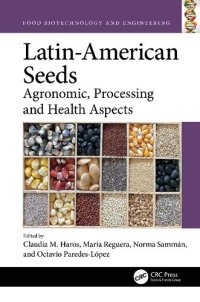
Ebook: Latin-American Seeds: Agronomic, Processing and Health Aspects
- Genre: Biology // Plants: Agriculture and Forestry
- Series: Food Biotechnology and Engineering
- Year: 2023
- Publisher: CRC Press
- City: Boca Raton
- Language: English
- pdf
In the last few years, the Latin-American seeds have gained increased importance (also due to the increased demand for gluten-free foods). Worldwide demand for Latin-American seeds and grains has risen in a high proportion. In parallel, seeds and grains' research from this region in all relevant fields has been intensified. Latin-American Seeds: Agronomic, Processing and Health Aspects summarizes the recent research on Latin-American crops regarding agronomic and botanical characteristics, composition, structure, use, production, technology, and impact on human health.
Latin-American cultivars studied here are included in the groups of cereals, pseudo-cereals, oilseeds, and legumes that are used in a great variety of innovative and traditional foods. The main crops that are covered in this book are Latin-American maize (Zea mays), amaranth (Amaranthus spp), quinoa (Chenopodium spp), kañiwa (Chenopodium pallidicaule), chia (Salvia hispanica), sacha inchi (Plukenetia volubilis) and legumes such as black turtle and common beans (Phaseolus vulgaris) and tarwi (Lupinus mutabilis).
Key Features
Contains updated information about recent research works on Latin-American crops
Includes a variety of Latin-American plant species that are used in a great variety of innovative and traditional foods
Addresses a wide range of topics related to agronomy, plant physiology, and nutritional and technological properties, processing, fractionation and development of new products for human health
Latin-American cultivars studied here are included in the groups of cereals, pseudo-cereals, oilseeds, and legumes that are used in a great variety of innovative and traditional foods. The main crops that are covered in this book are Latin-American maize (Zea mays), amaranth (Amaranthus spp), quinoa (Chenopodium spp), kañiwa (Chenopodium pallidicaule), chia (Salvia hispanica), sacha inchi (Plukenetia volubilis) and legumes such as black turtle and common beans (Phaseolus vulgaris) and tarwi (Lupinus mutabilis).
Key Features
Contains updated information about recent research works on Latin-American crops
Includes a variety of Latin-American plant species that are used in a great variety of innovative and traditional foods
Addresses a wide range of topics related to agronomy, plant physiology, and nutritional and technological properties, processing, fractionation and development of new products for human health
Download the book Latin-American Seeds: Agronomic, Processing and Health Aspects for free or read online
Continue reading on any device:

Last viewed books
Related books
{related-news}
Comments (0)